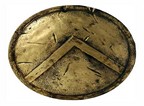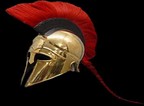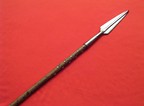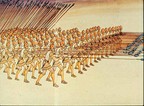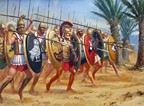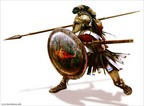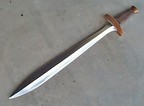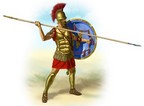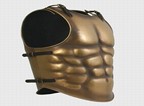What was the Archidamian War? It was the first part of the Peloponnesian War (431-404), the enormous clash between Athens and Sparta, which is named after the Spartan king Archidamus II. However, the war started in 431 and ended in 421 of which resulting an Athenian victory and a Spartan defeat. Nevertheless, Athenian political mistakes, Spartan inflexibility, and a shattering Athenian endeavour to triumph over the island of Sicily were amply adequate to alter the balance of power, so that Sparta might get a second opportunity: the Decelean or Ionian War.
In the Greek balance of power, the Archidamian War had to face severe obstacles. Athens had to make a treaty with Corcyra starting to surround Potidaea in 433 intimidating to reduce the town of Corinth which until then was the third in power town of the Greek territory. This was however; hazardous to Sparta: It indispensably required the Corinthian navy.
The Spartans got terrified assuming that Athens was going to be more powerful but yet made the utmost effort in order to prevent from war. They had declared that peace was probable when Athens would revoke a reasonably priced decree against Megara, a Spartan supporter. Pericles, the Athenian leader turned this down , because of the fact that Sparta and Athens had once agreed that clash would have to be solved by means of negotiation. If the Athenians would comply with the request of Sparta to recall the Megarian Decree, as a result they would allow Sparta to pass orders to Athens. War broke out between two regional empires as this was unacceptable: Athens with its Delian League and Sparta with its Peloponnesian League.
The cause of the declaration of war by Sparta was to free Greece from Athenian oppression, repression and suppression. Indeed, persecution, oppression and repression cannot suppress the uprising of a nation. Somewhat it was justified, because Athens had changed the Delian League into an Athenian empire (in the past, the Delian League was an alliance with a great support against the Persians).
Sparta pressed Athens to surrender with a view to achieving victory, whereas, Athens merely had to survive the attacks. However, it has to be noted that Pericles’ tactic was to vacate the rural area, leaving it to the Spartans while concentrating everyone in the city which could obtain supplies from across the sea. Furthermore, cattle, for example, would be kept on the isle of Evia. So long the “Long Walls” attached the city to its port Piraeus, so long Athens would rule the waves and so long Athens was liberated to strike against the coastal allies of Sparta from the sea, it might create great stress within the Spartan alliance.
Therefore, the situation of the Athenians was better than those of their enemies, and it is no wonder that the Spartans straight away asked for assistance in Persia. This is just evidenced by Diodorus, who pointed out that the Spartans did not just announce war, but had taken the decision to announcing war and seeking help in Persia. Thucydides also confessed, later on, that the Spartans had sent an embassy towards the east. They were unsuccessful toward achieving their aim, because they were captured by the Athenians.
War broke out when the Thebans, without declaring war, attempting to capture Plataea at the time of a night invasion. If it had been successful, Theban armies could easily move about to the Peloponnese, and Peloponnesian armies would be able to march forward to Boeotia. Nevertheless, the operation was unsuccessful, and Plataea would be a major bone of contention for the time being.
The Spartan king, Archidamus II attacked Attica (the surrounding area of Athens) in 431 and 430 while the Athenian admiral Phormion reacted with invasion on the Spartan navy. Nonetheless, it sooner became obvious that the Pericles’ tactic was too costly and the Athenian leader was ousted. The situation became worse, for, in 429, an awful plague broke out (probably typhoid fever) and had taken away the lives almost one third of the Athenian citizens, including Pericles. Not only that but the Spartans, at the same time, besieged Plataea which finally fell in 427.
Considering that Athens was about to fall down, the island of Lesbos had to revolt and Archidamus attacked Attica once more. Nevertheless, the Athenians were not defeated indeed. They had to suppress the revolt (427) and also board upon a policy which was more violent, attacking western Greece and initiating a small mission to Sicily to get support from the far west. Not only has that but at the same time, general Nicias apprehended the small islanded Minoa, which would Control the port of Megara. In the subsequent year, Nicias embezzled the island of Milos and the countryside of Tanagra and Locris while at the same time, Demosthenes, the Athenian commander sought to invade central Greece from the west, but he was unsuccessful.
The Athenian statesman Cleon was capable of tripling the compliment that the Athenians achieved, allowing the Athenian commanders for undertaking more bold actions. In 425, Demosthenes and Cleon attacked 292 Spartan soldiers on the island Sphacteria. The Athenians however; erected a castle at Pylos, where they could obtain runaway slaves and helots. As a result, this severely damaged the Spartan economy.
Attacking Attica was no more an option for the Spartans, in the meantime, but they had attacked Plataea which was controlling the way to Thebes and around. Going on alongside this road, the Spartans proceeded Thessaly and Macedonia and had started to attack Athenian belongings in the northern Aegean.
The Spartan Brasidas aggravated revolt in this region and attacked the tactically significant Athenian colony of Amphipolis. The Athenian commander Thucydides, who was really very late to protect this town, had to be exiled and became the historian of this war.
Furthermore, the other catastrophe that had befallen the Athenians was the defeat by the Thebans at Delium. Thereafter, an armistice of a year was signed (423-422). Having this been expired while Cleon, the Athenian war leader and the general of Sparta Vrasidas were killed in an action at the time of an Athenian endeavour to recover Amphipolis, however, both sides opted for peace: this is the famous Peace of Nicias which had already been satirized by the comedian Aristophanes before its signing.
To sum up, it has to be noted with paramount importance that Athens survived and became victorious in the Archidamian War. Nevertheless, the Spartans were not being resolutely beaten and although they were regretting that they had invaded Athens, they were still very powerful. Furthermore, this humiliated superpower had been looking for a chance to prove that it was still in a commanding position to be considered with. It didn’t have to linger very long…
